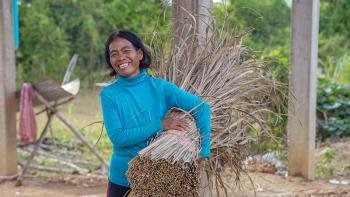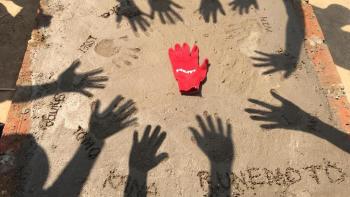Quick Facts
Individuals served in FY22: 1,505
- Through incremental building – 1505
Volunteers engaged in FY22: 122
Other facts:
- Population: over 54 million
- Life expectancy: 66.9 years
- Unemployment rate: 0.5 percent
- Population living below poverty line: 24.8 percent
Source: World Bank, World Factbook
Habitat for Humanity in Myanmar
Habitat for Humanity’s involvement in Myanmar arose after the devastating Cyclone Nargis struck on May 2, 2008. Together with its partner World Concern, Habitat for Humanity built and repaired more than 1,700 core houses in the worst-hit Ayeyarwady delta as part of World Concern’s integrated multi- sector disaster recovery program. In January 2014, Habitat for Humanity began projects in water and sanitation with disaster risk reduction with World Concern.
The housing need in Myanmar
At least 1 million people in Myanmar are in need of humanitarian assistance including shelter due to armed conflict, vulnerability to natural hazards or intercommunal violence, according to the United Nations. According to the last population and housing census of 2014 showed that close to 81% of housing units in Myanmar were not durable, about 28% of households obtained their drinking water from unsafe sources, and nearly 14% did not have a toilet.
Habitat for Humanity started working through partners in Myanmar after the devastating Cyclone Nargis in 2008. The office in Yangon opened in 2014 and direct project implementation began in 2016.
How Habitat addresses the need in Myanmar
Building resilience
In Myanmar, Habitat for Humanity builds community resilience against climate change and the lingering effects of the COVID-19 pandemic and the coup through development and humanitarian interventions. We partner with village, ward and school committees to promote empowered participation.
Habitat Myanmar’s key interventions include green and sustainable initiatives such as rainwater harvesting, home gardening, and resilient water and sanitation infrastructures. Habitat also provides humanitarian assistance to the vulnerable through distributing drinking water during the hot summer season, multipurpose cash assistance to meet basic household needs as well as livelihood support.
Empowering communities
We continue to influence community partners and other actors by raising awareness of safe sanitation and hygiene. We will pilot the participatory approach for safe shelter awareness, or PASSA, and clarify and disseminate information on land governance systems to promote secure tenure. Since March 2020, Habitat has suspended the hosting of international volunteers under the Global Village program in Bago region, north of Yangon. Local community volunteers have stepped up. They help to design, plan, implement, monitor and report construction and non-construction activities to Habitat Myanmar.


